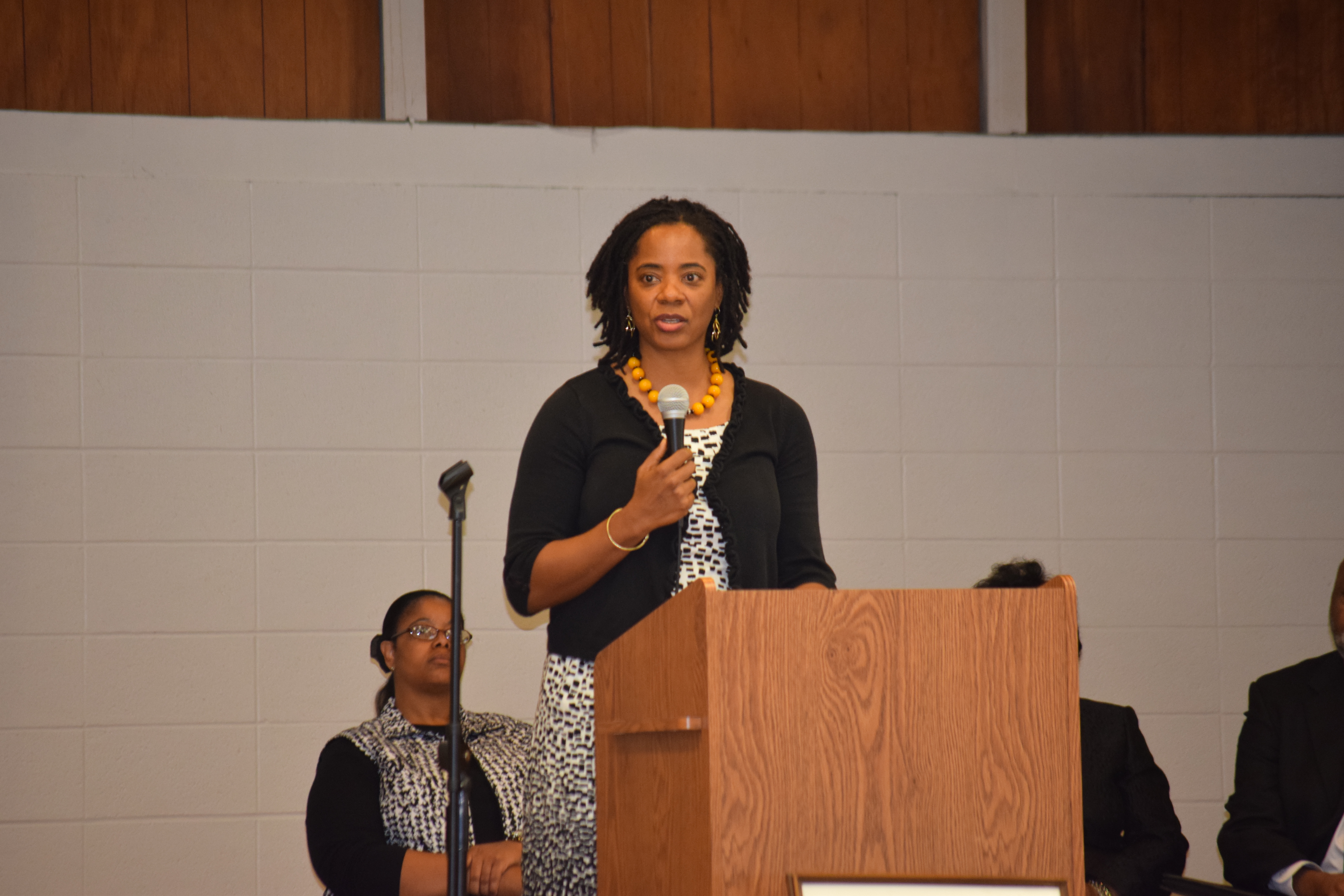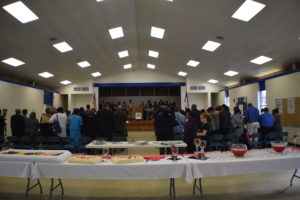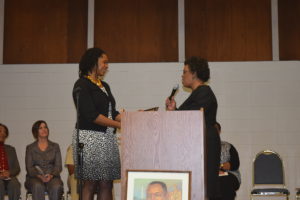Celebrating the Legacy of Dr. Martin Luther King, Jr.

By Will Johnson
Messenger Reporter
“With this faith we will be able to hew out of the mountain of despair a stone of hope.” – Dr. Martin Luther King, Jr.
CROCKETT – Community leaders, elected officials and other dignitaries gathered together Sunday afternoon, Jan. 15, in Crockett to honor and pay tribute to the legacy of Dr. Martin Luther King, Jr.
Held at the Crockett ISD Administrative Office Building Auditorium, the event was emceed by James Gentry and hosted by the Dr. Martin Luther King, Jr. Memorial Committee.
The founder and chairperson of the committee, Roberta Mason, led those assembled for the celebration in a litany describing the struggles and victories achieved by Dr. King in the fight against injustice and racial bigotr y. The program included music and song by Verna Harris Lilly Murphy who led the audience in a rendition of “How Great Thou Art.”
y. The program included music and song by Verna Harris Lilly Murphy who led the audience in a rendition of “How Great Thou Art.”
Other honored speakers and presenters included Crockett High School junior Jamie Jacobs, Rev. Earl Harris and Houston County Judge Jim Lovell who read a proclamation honoring the memory of Johnnie Faye O’Neal Mask McKnight.
District Attorney Donna Kaspar and Crockett ISD Superintendent Terry Myers provided greetings from the county and the City of Crockett, Mrs. Violet Jackson recognized the Dr. Martin Luther King., Jr. Memorial Committee and Rev. Jim Tom Ainsworth closed the program.
Introduced by Houston County Attorney Daphne Session, the afternoon’s keynote speaker was Dr. Angela Ards, an Associate Professor of English at SMU.
Dr. Ards received her Bachelor of Arts degree from the University of North Carolina, her Master’s Degree from UCLA and her Ph. D. in English from Princeton. She is the author of two books and has been published in Time magazine, The Nation, The Village Voice, Essence, Ms. and The Los Angeles Times.
“Dr. Ards’ work has been supported with fellowships from a number of institutions including Harvard University’s Radcliffe Institute for Advanced Studies and the W.E.B. DuBois Institute for African-American Research,” Session said.
After the introduction, Ards began her presentation with a little humor. She said it was her understanding the Dallas Cowboys were about to kick-off against the Green Bay Packers.
“That you have chosen to be with us at this hour shows your deep respect for Dr. King and we are grateful for your presence,” Ards said.
She explained her connection to Crockett and Houston County and said her father had grown up in the Simon Springs community “… where I have returned many a summer for family reunions, homecomings and other celebrations.”
As she continued, Ards said she considered it an honor to be able to speak on the actual birthday of Dr. King because it allowed a childhood fascination to become an adult reflection of who she said was the greatest civil rights leader of our time.
“I have titled my remarks today ‘Ou t of a Mountain of Despair, a Stone of Hope.’ That phrase is inscribed on the side of the King Memorial at the National Mall. The monument itself physically represents those words. It is a giant 30-foot, larger-than-life statue of Dr. King,” she said.
t of a Mountain of Despair, a Stone of Hope.’ That phrase is inscribed on the side of the King Memorial at the National Mall. The monument itself physically represents those words. It is a giant 30-foot, larger-than-life statue of Dr. King,” she said.
The English professor said the line was spoken in Dr. King’s “I Have a Dream” speech and came shortly before the conclusion of the oratory.
“Today,” she said, “I want to consider the portion right before that where Dr. King’ tells those gathered to ‘Go back to Mississippi, go back to Alabama, go back to South Carolina, go back to Georgia, go back to Louisiana, go back to the slums and ghettos of our northern cities, knowing that somehow this situation can and will be changed.’”
She said he was trying to say go back home and get to work and added she had grown up in the Hamilton Park area of Dallas. It had been said, Ards explained, there is a belief the civil rights movement was less obvious in Texas and the Dallas area, specifically because there was not the occurrence of incidents like those in Selma or Birmingham. However, the struggle and the words spoken by Dr. King were still evident, even today, to those who lived in the community.
“In some cases, you can simply replace the outdated word Negro with the more cosmopolitan phrase African-American or the more contemporary Latino or Muslim. Dr. King’s point about discrimination and exclusion still ring true,” she said.
“Even his eulogy for the four little girls, killed by a Klansman’s bomb as they attended Sunday school at the 16th Street Baptist Church in September of 1963 still applies to the Charleston Nine – the back congregants who were massacred last summer by white supremacist Dylann Roof, during a Wednesday night prayer meeting at Emanuel AME,” Ards said.
“Dr. King said then,” she continued, “Their deaths say to us that we must be concerned not with who murdered them but the system, the way of life and the philosophy which produced the murders. His words are just as true now.”
As she concluded her oratory, Ards expressed by allowing or adjusting to the current climate of real or perceived social injustice, there was a tacit acceptance for continued discrimination and a return to inequality.
“We all want to live well-adjusted lives but I’m sure that we will recognize ther e are some things in our society to which we should never be adjusted. There are some things to which we should be maladjusted if we are to be people of good will,” she said, as she quoted Dr. King.
e are some things in our society to which we should never be adjusted. There are some things to which we should be maladjusted if we are to be people of good will,” she said, as she quoted Dr. King.
“We must never adjust ourselves to racial discrimination and racial segregation. We must never adjust ourselves to religious bigotry. We must never adjust ourselves to economic conditions that take necessities from the many to give luxuries to the few,” Ards said. “Men and women should be as maladjusted as the prophet Amos, who in the midst of the injustices of his day, could cry out in words that echo across the centuries, ‘Let justice roll down like waters and righteousness like a mighty stream. Through such creative maladjustment we may be able to emerge from the bleak and desolate midnight of man’s inhumanity to man, into the bright and glittering daybreak of freedom and justice.”
Will Johnson may be contacted via e-mail at [email protected].






5